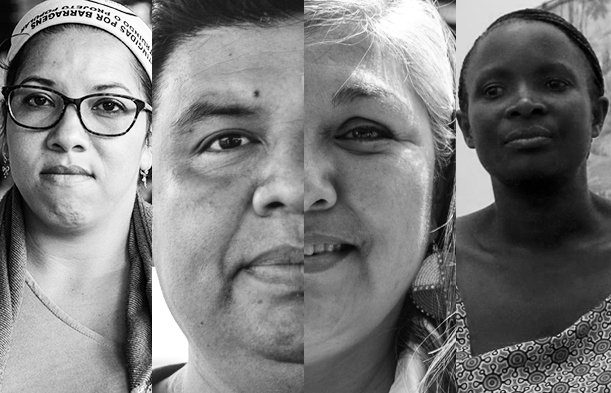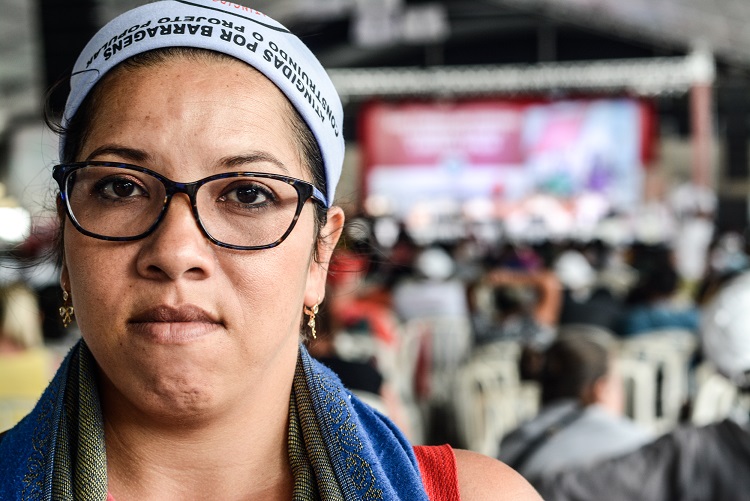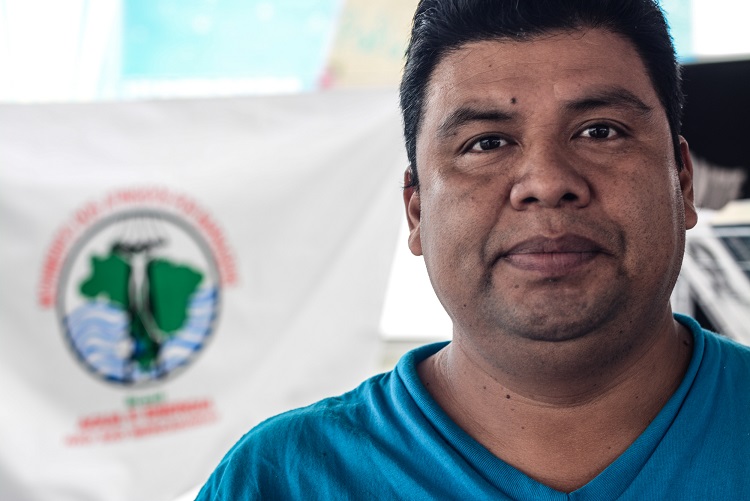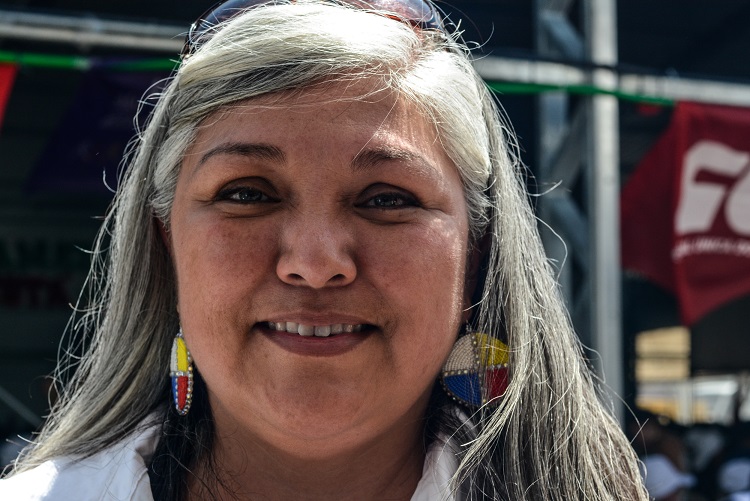Affected from the world, unite!

Nicinha’s body was found five months after her disappearance; she was an activist of the Brazilian´s Movement of People Affected by Dams (MAB) and was murdered last year, thousands of stories like this multiply throughout Latin America and in other parts of the world.
This crime has aroused outrage and national and international rejection. It has once again seen persecution and death against those who defend territories, water and dignified life, opposing the interests of capital and states, which, instead of guaranteeing the rights of the populations affected, are accomplices of these crimes.
But just as the repression and criminalization of the struggles has increased, we also see solidarity and internationalism as a potent strategy of peoples’ resistance against extractive capital.
From October 6 to 8, the “International Seminar: Energy Transition for a Popular Energy Project” was held, organized by MAB, a member of Via Campesina in Brazil, and the Movimiento de Afectados por Represa in Latin America (MAR). Among its main objectives are the denounce against current economic system and its energy model, the constant violations of human rights and the exploitation of the affected populations. And on that basis, strengthen unity, solidarity and define common strategies of struggles, both nationally and internationally, for a society alternative to capitalism.
Milena Flores
 In the energy sector, affected populations face daily persecution, displacement, expropriation and even death. Her organization, Ríos Vivos, resists the Hidroituango project, one of the largest hydroelectric plants under construction in southern Colombia. She is a hand-craft miner and fisher from the department of Antioquia, in the municipality of Briseño, and historically her life, as well as that of other small farmers and manual workers, has developed around the Cauca River, where the hydroelectric dam is currently being built. “We ask ourselves: energy for what? And for whom? In 2018, the dam will reach its maximum capacity and we will not be able to go up the river any further. Hand-craft small scale mine and fishing is part of our economy, but a lot of people have already gone, there are forced displacements, expropriations, and when the company comes, we do not know what we are going to do, we do not have other land and it’s in that indigenous territory of our grandparents where our life is.
In the energy sector, affected populations face daily persecution, displacement, expropriation and even death. Her organization, Ríos Vivos, resists the Hidroituango project, one of the largest hydroelectric plants under construction in southern Colombia. She is a hand-craft miner and fisher from the department of Antioquia, in the municipality of Briseño, and historically her life, as well as that of other small farmers and manual workers, has developed around the Cauca River, where the hydroelectric dam is currently being built. “We ask ourselves: energy for what? And for whom? In 2018, the dam will reach its maximum capacity and we will not be able to go up the river any further. Hand-craft small scale mine and fishing is part of our economy, but a lot of people have already gone, there are forced displacements, expropriations, and when the company comes, we do not know what we are going to do, we do not have other land and it’s in that indigenous territory of our grandparents where our life is.
The Movimento em Defensa de los Territorios e Afectador por Represas – Ríos Vivos has denounced multiple socio-environmental impacts generated by dams in Colombia. These denounces were collected in Corantioquia’s technical report and Resolution 0027 of 2016 of the National Authority for Environmental Licenses (ANLA). However, the building of the dam have not stopped and the Hidroituango dam will flood next year 4.500 hectares and will impact another 26.060 hectares of one of the most preserved tropical dry forests in Colombia.
Milena, along with her organization, has articulated collective denounces in defence of common and public goods. But despite this, the state remains silent. The articulation of struggles at international level is currently vital to this movement. “It is important to articulate ourselves in Colombia and Latin America to unite with one voice, among more people better. We can’t alone, this capitalist system oppresses us and, therefore, it is vital to unite. They want to take from our children the right to a life of dignity and peace”.
Francisco Morales
 He originates from the Mayapopti settlement, which inhabits the west of the department of Huehuetenango, Guatemala. He is a militant from the Maya People’s Council, CPO, a indigenous political movement that since 2004 has been promoting a process of direct and democratic participation of the people, exercising the free determination and exercise of the fundamental right of prior consultation, as stated in Article 169 of the International Labor Organization (ILO). Untill now, 80 counties have stated “no” to mining, hydroelectric and predatory extraction in their territories.
He originates from the Mayapopti settlement, which inhabits the west of the department of Huehuetenango, Guatemala. He is a militant from the Maya People’s Council, CPO, a indigenous political movement that since 2004 has been promoting a process of direct and democratic participation of the people, exercising the free determination and exercise of the fundamental right of prior consultation, as stated in Article 169 of the International Labor Organization (ILO). Untill now, 80 counties have stated “no” to mining, hydroelectric and predatory extraction in their territories.
“This is our peaceful and eminently democratic response to the imposition of an economic model that attacks the lives of our people. Today we are facing a new colonization, a new model of eviction as has happened 500 years ago in the name of false development. And with that clarity, we have said that we will fight for our territories, and fight for life”.
Not only has this movement promoted the prevention of the destruction of “mother earth”, it has also fostered the direct participation and participatory democracy of the people. Guatemala – like many countries in Latin America – is being subjected to the aggressive imposition of an economic model based on predatory extraction, which implies a re-concentration of strategic goods in the hands of transnational corporations with complicity of the States.
“Throughout these years we have met with other movements, we believe that our experiences is important, but we have also learned other ways, with new elements to strengthen our organization and our struggle. The State’s response to this democratic and legitimate participation of the people has been violence, the criminalization of the exercise of rights. This also shows the colonial structure of the State, because when we indigenous people claim rights, the State consider us delinquents, terrorists,” he emphasizes.
In all these processes of consultation and struggle there were many murders as well. Don Andrés Miguel from Barrillas was murdered last year, and this year Esteban Bernabé was assassinated – during a peaceful demonstration. Today, people are being persecuted and these actions of criminalization is a perverse strategy of the states and corporations. “They want to divide and demobilize community resistances. This does not only happen in Guatemala, but has become a method that is being applied in Honduras, Mexico, Colombia, Brazil and elsewhere in the world. We are convinced that we are facing monsters and corporations that have a lot of power, that have powerful partners. That is why we have no other way than to forge alliances. We have no doubts about being part of and strengthening MAR, a movement in defence of life at the Latin American level. We will not allow them to submit to a life without dignity.”
Francisco proposes solidarity and internationalism as a way to advance in a sovereign model of popular energy, in which people have the capacity to propose, but also to have control. “We are awakening the citizen and collective conscience of the peoples, we are thinking of the reconstruction of the territories, in another way of life,” he concludes.
Michelle Vendiola
 Michelle is a Native American born in Nevada, her community is named Walker River PaiuteT ribepero and currently she lives in Washington state, in the indigenous reservation of her husband and children. She began her struggle with education to enable the young people of her community to have access to knowledge. After Standing Rock’s situation last year, she felt very inspired and sought to get more involved in this fight. This indigenous nation in North Dakota faced the “Dakota Access Pipeline” project and was harshly repressed. The state has used dogs, even cold water cannons, as well as tear gas and rubber bullets. The violence to demobilize them lasted about six months, but the population, along with the allies, remained in resistance for all this time.
Michelle is a Native American born in Nevada, her community is named Walker River PaiuteT ribepero and currently she lives in Washington state, in the indigenous reservation of her husband and children. She began her struggle with education to enable the young people of her community to have access to knowledge. After Standing Rock’s situation last year, she felt very inspired and sought to get more involved in this fight. This indigenous nation in North Dakota faced the “Dakota Access Pipeline” project and was harshly repressed. The state has used dogs, even cold water cannons, as well as tear gas and rubber bullets. The violence to demobilize them lasted about six months, but the population, along with the allies, remained in resistance for all this time.
“There was a lot of solidarity across the country, as well as international solidarity. This feat drew attention to the human rights of the tribe, but also environmental issues, because the pipeline they wanted to build went through very important rivers, applying colonialism, but a different colonialism. Now they want to erase the culture of the people, exterminate them, without respecting our culture and the rights we have, “says Michelle.
The indigenous territories where many of the tribes recognized by the United States constitution live are strategic areas for corporations. Around the various tribes there is a great diversity of refineries, but they also want more. The territory called “Cherries Point” in Standing Rock is sacred to bury and revere the dead, but now the refineries want these lands because there are many oil reserves in the area.
In the region where Michelle lives with her family, they plan to build the Keystoneen project, from the coast and across the border to Canada. “If the pipeline has a rupture or if there are accidents with the ships coming to receive the oil, it would contaminate the entire coast.” The waters and the sea are a fundamental part of their way of living and their means of subsistence. Most of the population is made up of fishers, who build canoes, work hard to live and feed themselves. “When we mobilize the authorities, both the executive and the judiciary and the legislature, they try to persecute us. Not long ago a Republican senator tried to pass a law declaring the indigenous peoples economic terrorists, because he defends the oil for export, luckily, this has not passed. But he plans to put it in the next legislative session,” she says.
There are many criminalization actions in the country of “freedom”. Their organization has faced various types of censorship to prevent it from telling the world what is happening in its territories. The coroner and prosecutor succeeded in blocking the Facebook page with a lawsuit. But, thanks to the solidarity of the United States Union for Civil Liberties, they were able win over this sanction. “They want to pursue free expression, and to persecute all who follow us. They look at the identity of our followers, who likes our page, or who confirms presence in an action called by this social network. They argue that they only seek to take key information that is useful to the criminal case and that the rest of the information is confidential.” These unconstitutional actions continues to be denounced because they violate freedom of expression and set a dangerous precedent for censoring electronic platforms.
Michele also participates in the Community to Community Development , which works on issues such as migration, refuge, peasants and agricultural wage earners. “Sometimes people in the United States have trouble understanding the struggles in Latin America, they do not always know. It is an honor for me to be here and see these demonstrations and struggles, I realize that there are many people like us struggling to win their rights. We are all against fascism, against capitalism that oppresses both in the south and in the north, against the dams and against the appropriation of the territories”, she concludes.
Tebesigwa Florence
 The largest source of energy in Africa is hydropower, and countries like Ethiopia, Congo, Mozambique, and Uganda are moving to this type of energy production. Tebesigwa is a teacher and originally from Uganda. Ten years ago, she and her community had to leave part of their territory to give place for a dam construction with the hope of having energy, but the company’s promise was never fulfilled. “Dams do not generate energy for the poor. Today we are still living energy poverty, but also structural poverty. The basic needs of Africans are not considered, almost all the energy we produce is for export. The energy fares are very high and families often have to live without this right to guarantee other needs,” she explains.
The largest source of energy in Africa is hydropower, and countries like Ethiopia, Congo, Mozambique, and Uganda are moving to this type of energy production. Tebesigwa is a teacher and originally from Uganda. Ten years ago, she and her community had to leave part of their territory to give place for a dam construction with the hope of having energy, but the company’s promise was never fulfilled. “Dams do not generate energy for the poor. Today we are still living energy poverty, but also structural poverty. The basic needs of Africans are not considered, almost all the energy we produce is for export. The energy fares are very high and families often have to live without this right to guarantee other needs,” she explains.
Many of the energy projects in this region are approved with the complicity of the states, without consulting the populations or tribes. Many of them are exposed to constant intimidation and lack of freedom of expression. “We live in a dictatorship, in Uganda it is not possible to make this kind of meeting, to socialize our problems,” she says.
The construction of hydroelectric projects is mainly carried out with the inversion of transnational corporations and institutions such as the World Bank and the European Bank. Although there are also new actors, the so-called “China factor” is expanding in the African territories.
“The fight must continue, we want to look at what is happening here to put more force on the movement throughout Africa. We must approach as peoples fight against dictatorships and transnational corporations,” Tebesigwa concludes.
As we have witnessed in the voices of Milena, Francisco, Michelle and Tebesigwa, energy is at the center of imperialism. Transnational corporations and states want to increase their gains, take ownership of waters and territories, and transform life into value. But the oppressed in the global south and north are also making progress in building unity against capitalism, weaving together a large network of solidarity and internationalism, organizing people at all latitudes in the face of the urgency of a new energy and social model.
Text and Photos: Viviana Rojas/La Via Campesina
